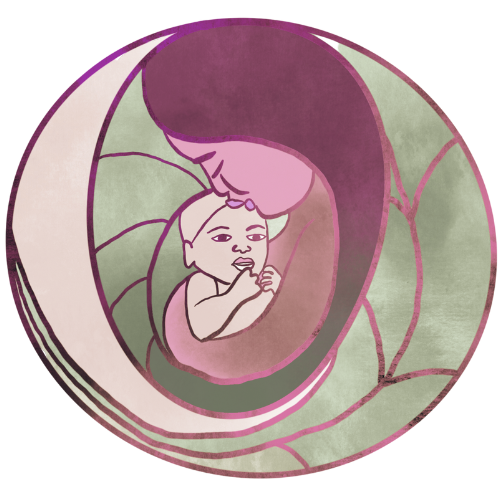Homebirth Kit
What do you need to have on hand for a home birth?
You’ll need to gather a few things to protect your mattress and floors, some things for the baby right after birth, and some other items for convenience, comfort, and clean up. I like to practice “leave no trace” home birth midwifery, so that the home is left looking as good as before labor started.
Your midwife will also need a few items, like sterile gloves, gauze, and cord clamps. I bring a box with a combination of clinical and comfort items to the 36-week home visit. I don’t charge extra for them, and I take home whatever we don’t use. Some midwives have their clients order generic or custom birth kits from a birth supply company, usually costing around $40-$60. Here’s a standard homebirth kit from Cascade. Here’s Cascade’s delux homebirth kit. And here you can see a number of midwives’ custom kits from In His Hands.
This is my homebirth kit
Below is the list I give my clients to prepare for our home visit. The idea is that when I arrive at your home during active labor, you and your partner can remain focused on laboring, and my assistant and I can take care of all the set up and clean up, labor support, and clinical tasks, without having to bother you for garbage bags and a thermometer, for example. You can find a downloadable, printable version of my birth supply list here.
Fruit of the Womb, LLC
Homebirth Supply List
Please acquire and gather in one place the following, prior to your 36-week home visit:
4-6 Bath towels - old, bleachable white, or dark colors
6-10 Washcloths - old, bleachable white, or dark colors
8-10 Receiving blankets - preferably the flannel kind.
Waterproof mattress cover that you will keep on your mattress.
Shower curtain or plastic cover for your bed
A set of sheets you don’t mind getting bloody. When your labor starts, make your bed with the waterproof mattress cover, then a set of good sheets, then the plastic sheet/shower curtain on your bed, and finally the junky sheets on top.
Large bowl for your placenta - plastic or metal
2 gallon-sized ziplock bags for your placenta
3 trash bags
Box of tissues
Thermometer - oral/axillary; Vicks Rapid Read is great because it works quickly
Plug-in heating pad to warm the receiving blankets for baby’s arrival
Depends - 1 package, to wear for the first few days after the birth.
Diapers for baby - if you are using cloth, make sure to wash and dry them a few times per the instructions so they will be absorbent.
Snacks and drinks for the birth, including easily digestible protein snacks and electrolyte drinks such as coconut water, smart/vitamin water, miso or chicken broth.
Ibuprofen for afterpains (especially for second and subsequent births)
Sitz bath
Hydrogen peroxide - to clean up any blood stains
An old comforter - to cover the pool - keeps the heat in
Pack a “Go bag” in case you or baby requires transfer to the hospital, including: clothing for baby and both parents, toiletries, snacks, phone charger, money, ID, insurance card, car seat installed, written hospital birth plan/preferences
Are you curious about the other costs associated with homebirth? You can read my article on the subject here. Fortunately, many insurance companies reimburse for home birth midwifery services. If you’re exploring your options now and would like to find out what your insurance company will cover, check out my billing service! They will run a verification of benefits for you for $25. My legal name, which you will need to find out if you will be reimbursed for my services, is Caitlin Manela.
I hope this is helpful information. Please be in touch with all your questions! I look forward to hearing from you.
FAQ
What’s in a homebirth kit?
Each midwife will have her own list of what’s included in a homebirth kit. Some common items include umbilical cord clamps, sterile and non-sterile gloves, a peri bottle, ice packs, disposable underwear, and waterproof disposable underpads.
What do you need for postpartum homebirth?
Adult diapers/Depends, a peri bottle, and disposable underpads; warm and nourishing meals and snacks, hydration on hand; medicinal herbs to brew up for perineal healing and a sitz bath, herbal tinctures for cramps; help with laundry, cooking, cleaning, pet care, and childcare; and the presence of understanding loved-ones.
What do I need to prepare for a home birth?
You’ll need to prepare your mind, body, spirit, home, family, and community. You’ll probably want to find a midwife and maybe a doula. If this is your first baby, your first vaginal birth, or your first unmedicated birth, I would strongly recommend taking a childbirth class. Check out my community resources page!
Why are home births not always recommended?
Home birth is not for everybody. If there is a likelihood of complications that can’t be handled at home or if you want pain medication, you’ll need to be in the hospital to give birth. If you don’t trust yourself or trust birth and do not choose to challenge those believes and/or feel that you can heal the trauma or transform the internalized cultural messaging you have received, home birth may not be your best choice. If you do not want to take responsibility for your health and well-being and would rather be told what to do by people you trust as experts, you’re probably better off working within the conventional medical system. Please forgive me if that sounds snarky or condescending. If you want to have a home birth but your partner is not on-board and will not make the shift, home birth might not be recommended. Not sure? Lets talk! Reach out anytime for a free consultation.

